| Srl | Item |
| 1 |
ID:
133612
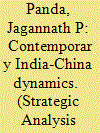

|
|
|
|
|
| Publication |
2014.
|
| Summary/Abstract |
This review essay examines the significance of India-China relations against the background of the current phenomenon of a multipolar world in the light of four recent publications on the subject. Tien-sze Fang's and Jeff M. Smith's works discuss the current facets of India-China relations, while William Antholis's and Carl J. Dahlman's works deal with the character and standing that India and China bring to their regional and global discourse. After reviewing the core of these books, this essay will seek to locate the dialogue and import of India-China relations in two constructive settings: first, the versatility of this relationship in a multipolar world order; second, why this relationship is important to the future of multipolar world politics. In the official idiom, India-China dynamics are not confined to the bilateral ambience. For example, a joint statement issued on the occasion of the visit of Premier Li Keqiang to India (May 20, 2013) records that 'There is enough space in the world for the development of India and China … As the two largest developing countries in the world, the relationship between India and China transcends bilateral scope and has acquired regional, global and strategic significance'.1 This official endorsement comes against the background that the year 2014 is the 60th anniversary of the occasion when the Panchasheel discourse was first enunciated.
|
|
|
|
|
|
|
|
|
|
|
|
|
|
|
|
| 2 |
ID:
128444
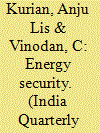

|
|
|
|
|
| Publication |
2013.
|
| Summary/Abstract |
Energy security is considered to be a universal issue in the twenty-first century. It denotes the right to use reliable sources of energy at competitive prices produced in an environmentally sustainable and safe means as well as the security of supply and demand. The strategic significance of energy security has been stirred by the political and economic events since 1970. The purpose of energy security is to guarantee adequate, reliable supplies of energy at reasonable prices in ways that do not endanger major national values and objectives. Energy security has different dimensions that vary from economic, environmental, social, foreign and technological progress which differ from country to country, and also from one period to another. To meet the growing aspirations of the people and the economies of South Asia, countries are under massive social and political strain to secure reliable, sustainable and reasonably priced energy supplies to meet the escalating demand for commercial energy. Energy security is thus no longer merely a catchword but an irrefutable reality for vital economic development throughout South Asia. And energy security will remain a high priority issue all over the world and the duty of ensuring energy security to the people and the state is not only confined to national governments but also to regional and international regime. This article analyses the emerging trends of energy security through the most debated contemporary issues such as climate change, sustainable development and globalisation.
|
|
|
|
|
|
|
|
|
|
|
|
|
|
|
|
| 3 |
ID:
185280
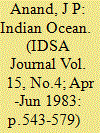

|
|
|
| 4 |
ID:
139596
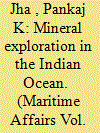

|
|
|
|
|
| Summary/Abstract |
India's lack of a concrete policy towards exploration for mineral resources in high seas and offshore areas has played a role, though to a limited extent, in the exploration projects being awarded to countries like Korea and China in the Indian Ocean. In 2011, China was awarded a large area in the Indian Ocean for mineral exploration. India has thence awakened to the issue and has made amends to its bureaucratic inertia. However, the question is whether these mineral exploration projects and demarcated ocean areas have economic implications only, or have larger strategic significance. In the contemporary debates, the ocean economy is gaining traction with more and more littoral nations seeking to generate revenue as well as royalty from ocean resources. This paper therefore attempts to address the issues of ocean economy, mineral exploration, exclusive economic zones (EEZ), interests of small island nations, and how these issues have a larger strategic implication.
|
|
|
|
|
|
|
|
|
|
|
|
|
|
|
|
| 5 |
ID:
069132
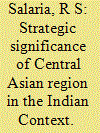

|
|
|
| 6 |
ID:
164124


|
|
|
|
|
| Summary/Abstract |
As the globalising trend of the twenty first century gained a new momentum with trade and commerce and economic engagement among nations, the issue of connectivity projects also moved to the centre stage of international politics. What gave a further stimulus to connectivity projects was the opening of the vast Eurasian landmass after the break-up of the Soviet Union in 1991. The Eurasian space is extremely rich in natural resources and vital minerals, but the Eurasian landmass is landlocked. Eurasian region’s landlocked status spurred the construction of overland transport corridors in order to secure and if possible, to control the natural resources. The opening of this region also resulted in the reinvention of the British geographer Halford Mackinder’s theory of “Heartland of Eurasia” and the “Pivot of History”. In the process the world witnessed an evolving interplay of economics and geopolitics in Eurasia both by the developed and developing countries. In this context the connectivity issue acquired immense significance. It was one of the key issues on the agenda of those powers involved in Eurasia.
|
|
|
|
|
|
|
|
|
|
|
|
|
|
|
|
| 7 |
ID:
019498


|
|
|
|
|
| Publication |
Summer 2001.
|
| Description |
187-198
|
|
|
|
|
|
|
|
|
|
|
|
|
|
|
|
| 8 |
ID:
176460
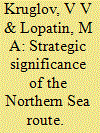

|
|
|